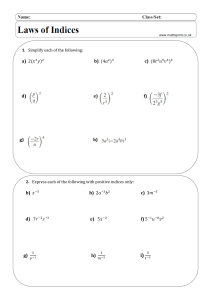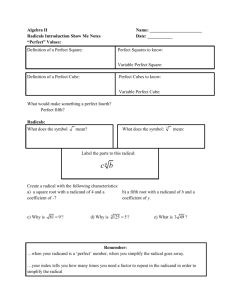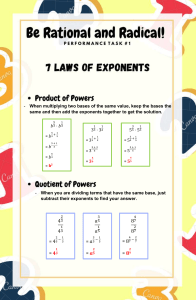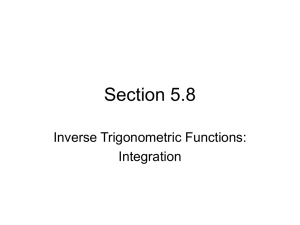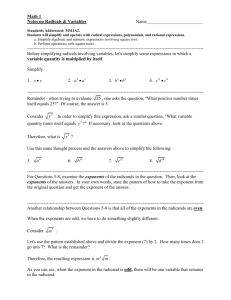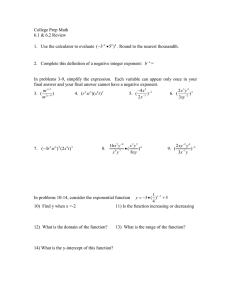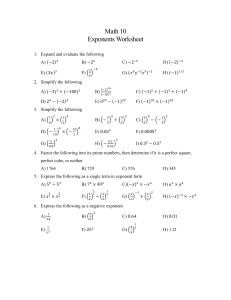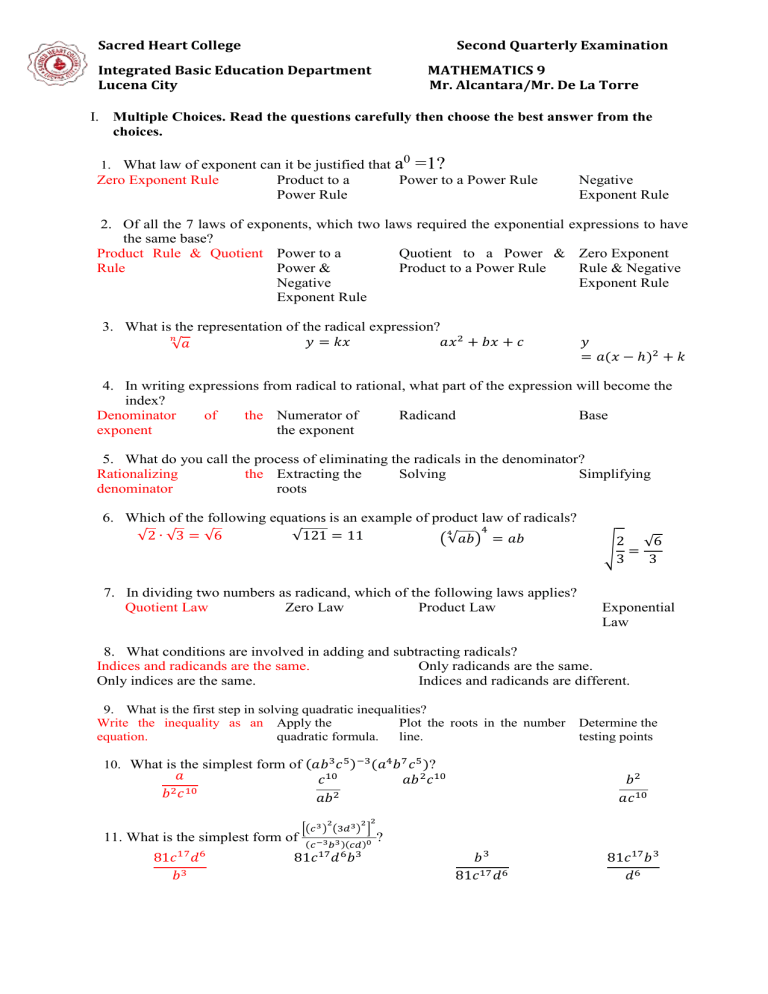
Sacred Heart College Second Quarterly Examination Integrated Basic Education Department Lucena City MATHEMATICS 9 Mr. Alcantara/Mr. De La Torre I. Multiple Choices. Read the questions carefully then choose the best answer from the choices. 1. What law of exponent can it be justified that a0 Zero Exponent Rule Product to a Power Rule =1? Power to a Power Rule Negative Exponent Rule 2. Of all the 7 laws of exponents, which two laws required the exponential expressions to have the same base? Product Rule & Quotient Power to a Quotient to a Power & Zero Exponent Rule Power & Product to a Power Rule Rule & Negative Negative Exponent Rule Exponent Rule 3. What is the representation of the radical expression? 𝑛 𝑦 = 𝑘𝑥 𝑎𝑥 2 + 𝑏𝑥 + 𝑐 √𝑎 𝑦 = 𝑎(𝑥 − ℎ)2 + 𝑘 4. In writing expressions from radical to rational, what part of the expression will become the index? Denominator of the Numerator of Radicand Base exponent the exponent 5. What do you call the process of eliminating the radicals in the denominator? Rationalizing the Extracting the Solving Simplifying denominator roots 6. Which of the following equations is an example of product law of radicals? 4 4 √2 ∙ √3 = √6 √121 = 11 ( √𝑎𝑏) = 𝑎𝑏 7. In dividing two numbers as radicand, which of the following laws applies? Quotient Law Zero Law Product Law 2 √6 √ = 3 3 Exponential Law 8. What conditions are involved in adding and subtracting radicals? Indices and radicands are the same. Only radicands are the same. Only indices are the same. Indices and radicands are different. 9. What is the first step in solving quadratic inequalities? Write the inequality as an Apply the Plot the roots in the number Determine the equation. quadratic formula. line. testing points 10. What is the simplest form of (𝑎𝑏 3 𝑐 5 )−3 (𝑎4 𝑏 7 𝑐 5 )? 𝑎 𝑏 2 𝑐 10 𝑐 10 𝑎𝑏 2 2 11. What is the simplest form of 17 6 81𝑐 𝑑 𝑏3 2 2 [(𝑐 3 ) (3𝑑3 ) ] (𝑐 −3 𝑏 3 )(𝑐𝑑)0 17 6 3 81𝑐 𝑑 𝑏 𝑏2 𝑎𝑐 10 𝑎𝑏 2 𝑐 10 ? 𝑏3 81𝑐 17 𝑑 6 81𝑐 17 𝑏 3 𝑑6 Sacred Heart College Second Quarterly Examination Integrated Basic Education Department Lucena City MATHEMATICS 9 Mr. Alcantara/Mr. De La Torre 12. Which of the following is the rational form of 3√(3𝑥𝑦)? 1 3𝑥𝑦 9𝑥 3 𝑦 3 (3𝑥𝑦)3 27𝑥𝑦 13. Numerators of exponents in exponential form become what part of the radical form? Exponent of the Radicand Index Radicand Radicand 6 14. What is the simplest form of √64𝑥18 𝑦 6 ? 2𝑥 3 𝑦 2𝑥 3 𝑦 2 2𝑥 3 𝑦 3 2𝑥 3 𝑦 4 4 15. Which of the following process can be used to simplify √9𝑥 2 𝑦 2? Lowering the index Rationalizing Product law the denominator Other rules 16. Which of the following is NOT the condition in multiplying radicals? Indices and radicands are Indices are Indices are the same but Indices and the same different but radicands are different radicands are radicand are different different 17. Which of the following inequalities is a quadratic inequality? 𝑥 3 + 𝑥 2 ≤ 2𝑥 2 + 𝑥 3 − 4 3𝑥(𝑥 + 2) > 3𝑥 2 𝑥(𝑥 + 5)(𝑥 − 4) ≤ 4 (𝑥 + 2)(𝑥 − 3) − 𝑥2 < 0 18. Which of following is the graph of the interval 2 ≤ 𝑥 ≤ 4? 19. Simplify (−4)−2 𝑥 −1 𝑦 2 𝑧 3 𝑦2𝑧3 16𝑥 −𝑦 2 𝑧 3 16𝑥 16𝑦 2 𝑧 3 𝑥 −16𝑦 2 𝑧 3 𝑥 5 20. Write into radicand (3𝑥 + 1)4 and simplify if possible. 4 3𝑥 + 1 √3𝑥 + 1 4 √(3𝑥 + 1)5 √3𝑥 + 1 4𝑥 3 𝑦 2 4𝑥 3 𝑦 3 5 √(3𝑥 + 1)4 3 21. Simplify: √64𝑥 9 𝑦 3 4𝑥 3 𝑦 22. Which of the following is the conjugate surd of (√2 + √5)? (√2 − √5 ) (√5 − √2 ) (−√2 − √5 ) 23. Solve: 5√𝑥 − 1 = 40. 65 63 4𝑥 3 𝑦 4 (√2 + √5) 84 86 24. Which of the following is the solution set of the quadratic inequality 𝑥2 − 𝑥 − 12 > 0? −3 > 𝑥 > 4 −3 < 𝑥 < 4 −3 > 𝑥 < 4 4 > 𝑥 < −3 Sacred Heart College Second Quarterly Examination Integrated Basic Education Department Lucena City 36 MATHEMATICS 9 Mr. Alcantara/Mr. De La Torre −2 25. Evaluate ( 5 ) 3 1 9 − 1 9 9 81 4 8 −25𝑥 8 25𝑥 8 1 26. What value of k will make 64𝑘 = 2 6 2 27. Evaluate √(−5𝑥 4 )2 . 5𝑥 4 −5𝑥 4 28. What is the number when the square root of the sum of a number and 9 is 12? 135 144 153 29. If 𝑥 ≥ 1, what would be the other solution of the inequality 2𝑥 2 − 3𝑥 ≤ 5? 5 5 𝑥 ≥ −1 𝑥≤2 𝑥≥2 30. If 𝑥 ≥ 2, what is the solution of 𝑥 2 − 6𝑥 + 8 ≤ 0? 𝑥≤4 𝑥≥4 𝑥 ≤ −4 276 𝑥 ≤ −1 𝑥 ≥ −4
